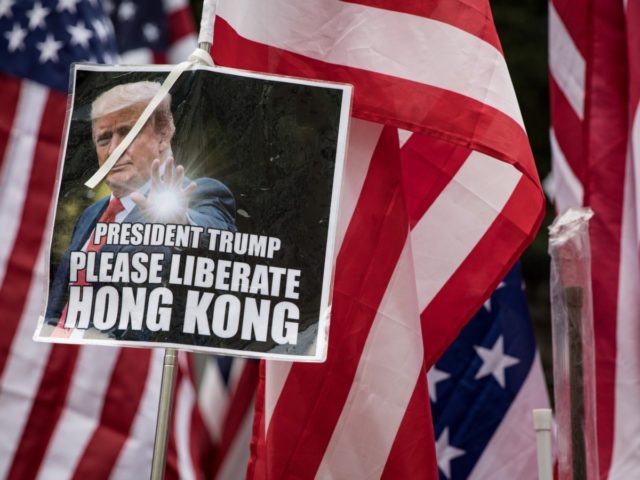Chinese dictator Xi Jinping signed a decree on Tuesday enacting a “national security” law that allows the Communist Party to antagonize and prosecute dissidents in Hong Kong, triggering global condemnation and widespread concern among participants in the Hong Kong pro-democracy movement.
The city – technically part of a China, but legally autonomous from Beijing – has experienced over a year of ongoing protests against China’s many attempts to undermine the “One Country, Two Systems” policy that allows Hongkongers the right to free speech and free assembly. The protest movement took off in mid-2019 in response to a proposed law in the Hong Kong Legislative Council (LegCo) that would have allowed China to extradite anyone present in the city if accused of violating Communist Party laws, which include prison sentences for crimes like “picking quarrels and provoking trouble.”
LegCo ultimately withdrew consideration of the bill, prompting Beijing’s National People’s Congress (NPC) to declare that Hong Kong had abandoned its responsibility to ensure a legal framework exists to protect the Communist Party. In response, the NPC passed a bill in May – which had not yet been written – that allowed Beijing to arrest and prosecute people in Hong Kong if accused of threatening the “national security” of China by, among other things, expressing support for human rights and opposition to the Party.
After the law passed, Party officials wrote it, and Xi signed it into effect on Tuesday.
According to the Chinese propaganda outlet Global Times, the law allows Beijing to intervene in Hong Kong against acts of “secession, subversion of state power, terrorist activities, and collusion with foreign forces.” It also requires Beijing, not Hong Kong, officials to prosecute those accused.
“Under the law, the Chinese central government would establish a commissioner’s office for national security affairs in [Hong Kong] to safeguard national security,” the state-run newspaper asserted, “and sources close to the matter confirmed with the Global Times that the office has ultimate juridical power, as it would ‘have the final say’ on national security-related cases.”
The Global Times applauded the law as “reasonable, necessary, and in line with the Chinese Constitution,” which Hong Kong, due to “One Country, Two Systems,” does not actually have to abide by.
China’s loyal Hong Kong chief executive, Carrie Lam, confirmed on Tuesday that the law would go into effect on Tuesday evening.
“Dedicated units in the Hong Kong Police Force and the Department of Justice will be responsible for implementing the relevant legal provisions in the National Security Law,” a statement from Lam read, seemingly contradicting Chinese state media reports that Beijing’s selected representatives would enforce the law.
Lam also bizarrely thanked the public for its “overwhelming support” of the law, when in reality thousands have taken the streets of Hong Kong to oppose it and its spiritual predecessor, the extradition law.
Lam also addressed global alarm over the new legislation at a virtual U.N. Human Rights Council meeting, clarifying that the law is, indeed, aimed at silencing protesters.
“Since last June, Hong Kong has been traumatized by escalating violence fanned by external forces,” she asserted, referring to the largely peaceful pro-democracy protests in the city, many of which were met by violence from pro-China agents. “During this period, groups advocating ‘Hong Kong independence’ and ‘self-determination’ incited protesters, very often radicalized young people, to desecrate and burn the national flag, vandalise the national emblem and storm the central government’s office in Hong Kong.”
In an editorial, the Global Times celebrated that the law appeared to already have a chilling effect on speech in Hong Kong, citing the retirement from public life of several older members of the pro-democracy movement that had been targeted with aggressive arrests for pro-democracy statements.
“Some people say that Hong Kong’s traitors are turning upside-down in the face of the coming national security law,” the Times gloated.
Hong Kong’s pro-democracy lawmakers are demanding a meeting with Lam to clarify what speech is now illegal, asserting in a letter addressed to the pro-China head of LegCo that the law “fundamentally changes the rights of everyone in Hong Kong.”
Some in the pro-democracy activism community responded to the news with vows to continue to peacefully demonstrate.
“We hope all Hongkongers, regardless of your skin color, race and religion, can take to the streets to oppose the national security law,” Figo Chan, a member of the Civil Human Rights Front, which has ensured that many of the past year’s protests have legal permits, said on Tuesday, according to Apple Daily. “But we must not fear. If we fear, we will lose our freedoms and rights for sure.” Chan’s group and several others have organized a protest for Wednesday.
In the United States, the Trump administration announced that, in response to the law, Hong Kong would lose its special trade status, as the law erases the city’s autonomy on which that status is based.
“The United States will today end exports of US-origin defense equipment and will take steps toward imposing the same restrictions on US defense and dual-use technologies to Hong Kong as it does for China,” Secretary of State Michael Pompeo said. “We can no longer distinguish between the export of controlled items to Hong Kong or to mainland China. We cannot risk these items falling into the hands of the People’s Liberation Army, whose primary purpose is to uphold the dictatorship of the CCP [Chinese Communist Party] by any means necessary.”

COMMENTS
Please let us know if you're having issues with commenting.